
Bachata Rosa is the fifth studio album by Dominican singer-songwriter Juan Luis Guerra and his group 4.40. It was released on 11 December 1990, by Karen Records. It brought bachata music into the mainstream in the Dominican Republic and gave the genre an international audience. A Portuguese version of the record was released in 1992 under the title Romance Rosa; it was certified gold in Brazil. The album received a Grammy Award for Best Tropical Latin Album and two Lo Nuestro Awards for Tropical Album of the Year and Tropical Group of the Year.
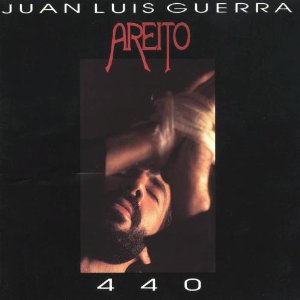
Areíto is the sixth album by Juan Luis Guerra with his band 440, released on 8 December 1992, by Karem Records. The album, meant to be a tribute to the indigenous tribes of the Dominican Republic, is named after a dance that the aboriginal inhabitants of the Greater Antilles (Taínos) accompanied with songs during their festivals and religious rites. The album contains twelve tracks including "Cuando te Beso", interpret by Santo Domingo Philharmonic Orchestra. Congolese musician Diblo Dibala played guitar on the song "El Costo de la Vida", which was a Spanish cover of his own soukous song "Kimia Eve", while the last track on the album, "Naboria daca, mayanimacaná", is sung in Arawak, the language of the Taíno people. Areíto was originally set to be released in early April 1992, but was first delayed to the end of October 1992 and was finally released on 8 December 1992.
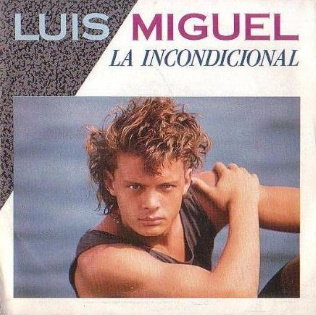
"La Incondicional" is a pop song written, produced, and arranged by Spanish Juan Carlos Calderón and performed by Mexican singer Luis Miguel. It was released in 1989 as the third single from his studio album entitled Busca una Mujer (1988) and became his second #1 single on the Billboard Hot Latin Tracks chart after "Ahora Te Puedes Marchar" in 1987. The song broke several airplay records in Latin America, topping the charts in Mexico, Chile and Peru; and the top-ten in other countries. The success of the song helped push the album to #3 on the Billboard Latin Pop Albums with approximate sales of four million units.
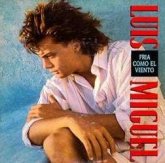
"Fría Como el Viento" is a ballad written, produced and arranged by Juan Carlos Calderón and performed by Mexican singer Luis Miguel. It was released as the first single from the Grammy-nominated studio album Busca una Mujer (1988). The song became the third number-one single for the singer in the Billboard Hot Latin Tracks chart after "Ahora Te Puedes Marchar" in 1987 and "La Incondicional", the preceding single.

"Tengo Todo Excepto a Ti" is a pop song written, produced, and arranged by Juan Carlos Calderón, and performed by Mexican singer Luis Miguel. It was released as the lead single from his studio album 20 Años (1990). It reached the number one position all over Ibero-America, became his fourth number-one single in the Billboard Hot Latin Songs chart after "Ahora Te Puedes Marchar", "La Incondicional" and "Fría Como el Viento" and was nominated for Pop Song of the Year at the Lo Nuestro Awards. The parent album peaked at number two in the Latin Pop Albums chart and sold more than 600,000 copies in its first week of release.

Grandes Éxitos de Juan Luis Guerra y 440 or simply Grandes Éxitos is a compilation album of Dominican singer-songwriter Juan Luis Guerra, and his band 440 released in July 1995 by Karem Records. It contained Guerra's fifteen biggest hits from 1988 to 1994 on the original version and from the albums Mudanza y Acarreo(1985) to Fogarate! (1994) on the international versions. The compilation receive positive reviews by the critics.

"Burbujas de Amor" is a song by Dominican singer-songwriter Juan Luis Guerra, released as the third single of his album Bachata Rosa (1990). It is widely considered one of Guerra's most popular songs. The song was a commercial success and became an international hit in Europe and Latin America. It peaked at number 2 on the Hot Latin Songs chart. The track received universal acclaim from critics and was praised for its sophisticated lyrics and elegance.
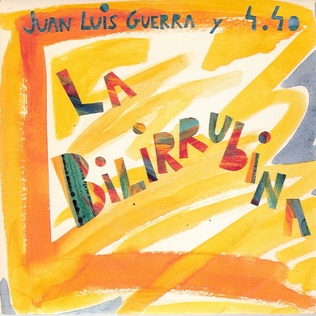
"La Bilirrubina" is a song by Dominican singer-songwriter Juan Luis Guerra. It was written by Guerra and released by Karem Records on 1990 and 1991 in Europe as the second single from his fifth studio album, Bachata Rosa. It was nominated for Record of the Year at 1991 Lo Nuestro Awards. The merengue track is considered one of Guerra's signature songs and most popular. It receive positive reviews and was listed one of the best tracks of the album.
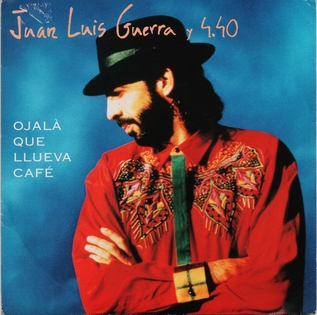
Ojala Que Llueva Cafe is the lead single by the Dominican artist Juan Luis Guerra and his band 4:40 from their fourth studio album of the same title. It was released on 1989 by Karem Records and 1990 in Europe by Ariola Records. The lyrics are a poetic metaphor about the poor conditions of the hard-working people residing in the countryside and the hope that the things are going be better someday in the future. Is one of Guerra’s signature songs and one of the first tracks to gain international attention in his career, peaking on the Billboard Hot Latin Tracks and Latin America airplay charts. The music video was ranked number one of the top 15 best music videos of all time by Dominican artists.
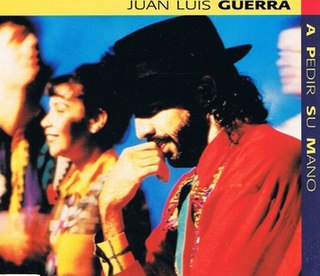
A Pedir Su Mano is a song by Dominican Republic singer-songwriter Juan Luis Guerra released as the fourth single for his album Bachata Rosa (1990). It was released in 1990 by Karem Records and in 1992 on Europe by Ariola. The track is a merengue version of the song “Dede Priscilla,” by Lea Lignazi from the Central African Republic. The track combined music elements of Afropop and zouk with merengue. The music video shows people in traditional African dress dancing in sugarcane fields with a cartoon of a red train traversing the landscape.
Estrellitas y Duendes is a song by Dominican Republic singer-songwriter Juan Luis Guerra released as the fifth single for his album Bachata Rosa (1990). It was released in 1991 by Karem Records. The track is a Bachata with elements of Bolero. It reached the top-ten on the US Billboard Hot Latin Songs and his native Dominican Republic. A live version of the track was later included on Coleccion Romantica (2001).
Carta de Amor is a salsa song by Dominican singer-songwriter Juan Luis Guerra released in 1990 and served as the lead single from his sixth studio album Bachata Rosa (1990). Track talks about how he writes a letter to his lover in his journal, punctuation marks included. It is the second song of the album along with Como Abeja Al Panal to have salsa approach on the album. It was peaked as a highlight track of the album by Allmusic. It peaked at number 35 on Hot Latin Songs and was included in Guerra's greatest hits album Grandes Éxitos Juan Luis Guerra y 440 (1995).

"Bachata Rosa" is a song by Dominican Republic singer-songwriter Juan Luis Guerra released in 1991 and served as the lead seventh and final from his fifth studio album Bachata Rosa (1990). Along with Estrellitas y Duendes and Como Abeja Al Panal, is one of Guerra's first international hits and helped to contribute to the bachata sophistication and have recognition in Latin America and Europe. The track was a commercial success, toping the airplay charts in Mexico and was the fourth single of the album to peak insade of the top 10 at the US Hot Latin Tracks.
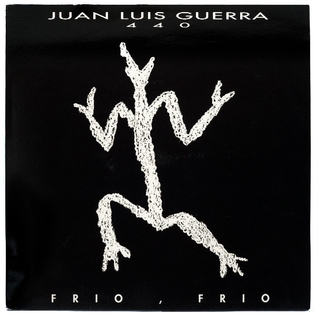
Frio Frio or Frio, Frio is the lead single of the sixth studio album Areito by Dominican superstar Juan Luis Guerra. The track is a bachata and was wrote based on a poem by Federico García Lorca and was released in August 1991. The track was receive positive reviews by the critics and was nominated for Tropical Salsa Song of the Year at the 4th Lo Nuestro Awards. Frio Frio was a success peaking at number 4 on Billboard Hot Latin Tracks and at the Top 5 airplay in Panama and Uruguay.

Señales de Humo is the second single of Juan Luis Guerra sixth studio album Areito (1992). The track is divided in two parts: The first part is a bachata and the second one the rhythm transformed to Mambo with elements of son and salsa. The title made reference of the communication that the indigenous use between vast and unpopulated areas and that are made by bonfires. The song met with critical acclaim and won Song of The Year at the 1994`s BMI Latin Awards. The track was a great success in Latin America and Billboard US Latin charts. The track was included on Guerra`s compilation album Colección Romantica (2001).
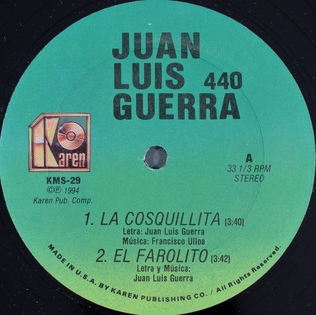
La Cosquillita is the lead single of the seventh studio album Fogarate! by dominican superstar Juan Luis Guerra. It was released on June 21, 1994 by Karen Records. The rural merengue track was written and produced with the Dominican accordionist Francisco Ulloa and his band. About the success of the track, Guerra stated "With the `perico ripiao' we are doing the same thing that we did with the `bachata,' breaking down the barriers that prevent it from reaching all of Dominican society, and then exporting it". The song became Guerra's first number-one hit in his native Dominican Republic; and became a top-ten hit in Spain, Venezuela and the US Hot Latin Songs chart.
"El Farolito" is a song recorded by Dominican singer Juan Luis Guerra for his seventh studio album, Fogaraté (1994), included as its eighth track. It was composed and produced by Guerra and the Dominican accordionist Francisco Ulloa and his band. The track is a Perico Ripiao, better known as merengue tipico, a rural version of merengue and it describes the curves of the body of a lover and his feelings for her. According Guerra, "El Farolito" is his favorite track on the album. The track was received well by the critics and according to some is "a kind of higher-class version of merengue típico".
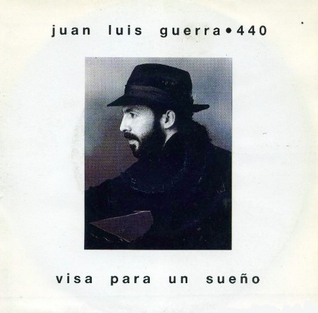
Visa Para Un Sueño(English: Visa for a dream) is the third single by Dominican artist Juan Luis Guerra and his band 4:40 from their fourth studio album Ojalá Que Llueva Café. It was released in 1989 by Karem Records and a year later in Spain. The track is a merengue that provides a social commentary about the vicissitudes of obtaining a visa to travel to the United States to work, get better life conditions, escape of the poverty on the third world countries and the state of mind that many Dominicans has. The track was inspired on the illegal trips to Puerto Rico that many Dominicans take every year to find better living and working conditions.
"Rosalía" is a song recorded by Dominican singer Juan Luis Guerra for his seventh studio album, Bachata Rosa(1990), included as its first and opening track. It was composed and produced by Juan Luis Guerra and his band 4.40. The track is an upbeat merengue about a lover named Rosalia.The track contains poetic metaphors and lyrics describing that he loves her.Following the success of Bachata Rosa, the track charted inside of Panama Airplay.Eventually, the track was included on the live album Entre Mar y Palmeras (2021) and served as the opening track on the setlist of the tour of the same name.









